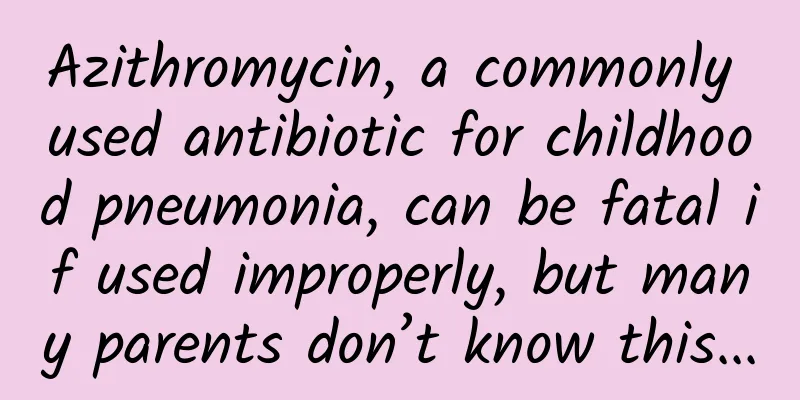Azithromycin, a commonly used antibiotic for childhood pneumonia, can be fatal if used improperly, but many parents don’t know this...

|
Since the beginning of winter, many places have experienced a "cliff-like" drop in temperature, various common winter diseases have quietly increased, and pediatric pneumonia has also entered its peak season. The little patients in the pediatric department of the hospital have red faces and keep coughing, which really makes their parents feel distressed. Mycoplasma pneumoniae and Chlamydia pneumoniae are common pathogens that cause pneumonia in children, and one of the "nemesis" of these two pathogens is azithromycin. Azithromycin is a commonly used "weapon" for pediatricians to fight infection, but its use is very particular. If used incorrectly, it will not only fail to achieve the effect of treating the disease, but may even be fatal. Dosage form and dosage are optional Dosage form recommendation: When used to treat children's diseases, granules and dry suspensions are preferred, which should be dissolved in warm water before taking; tablets and capsules are not recommended for preschool children. Dosage determination: For patients with a body weight of less than 45 kg, the dose is determined according to the body weight; for patients with a body weight of more than 45 kg, the dose can be used as an adult. Parents should pay attention to the dosage form when using the medicine, and the total dose during the course of treatment should not exceed 1500 mg. Time selection: Most domestic dosage forms require taking the drug 1 hour before or 2 hours after a meal; while imported dosage forms can be taken with food. Inappropriate for concurrent use: Do not take with antacids containing aluminum and magnesium. Taking it is a "technical job" Many parents have heard doctors remind them: "Take azithromycin for 3 days and then stop for 4 days." Some parents worry whether this course of medication is enough. In fact, this is because azithromycin has a long half-life and can maintain effective antibacterial activity for a long time (4 days after discontinuation of the drug). At present, in addition to the three-day medication method of "take three days and stop four", there is also a five-day medication method, that is, take dose A on the first day, and take dose A/2 orally every day from the second to the fifth day (dose A is determined by body weight). If the condition is not effectively controlled after taking the medicine according to the course of treatment, you must consult a doctor in time and adjust the treatment plan under the doctor's guidance. Be careful when taking medicine Macrolide drugs such as azithromycin can cause prolongation of the QT interval of the heart rhythm during use. Therefore, patients with heart disease cannot use azithromycin, otherwise there is a risk of fatal arrhythmia. The following 4 types of children should avoid using it: 1) Patients with confirmed QT interval prolongation and bradycardia; 2) Patients with a history of torsades de pointes; 3) Those who are in arrhythmogenic conditions, such as uncorrected hypokalemia and hypomagnesemia; 4) Those who are currently using antiarrhythmic drugs, antipsychotic drugs or antidepressants. Such "mixing" can easily be fatal In addition, when using azithromycin, you should be careful not to "mix" other drugs at will. For example, azithromycin combined with digoxin can cause cardiotoxicity; combined with statins, it can cause acute liver necrosis; combined with compound licorice tablets, it can cause arrhythmia; combined with ergotamine, it can cause ergotamine poisoning... These "mixes" may cause fatal harm. Therefore, before giving your baby azithromycin, please inform your doctor in advance of other medications your baby is taking to avoid "mixing" and causing serious adverse reactions. Winter is the peak season for diseases. Parents should pay attention to the following points: 1. If your baby has a fever, you should seek medical attention promptly, get a clear diagnosis, and receive symptomatic treatment. Do not blindly use medication to delay the condition. 2. Be sure to inform your doctor of your basic medical history before taking any medication, and use the medication under the doctor's guidance. 3. Follow the doctor's advice and take the medicine according to the recommended dose and course of treatment. Do not increase the dose at will to avoid drug accumulation. 4. Pay attention to allergic reactions (such as rash, itching, etc.) during medication. If any occur, stop taking the medicine immediately and seek medical treatment. 5. Take good care of your baby’s own protection, enhance immunity, and get vaccinated in time. Author: Zhang Wei, Chief Pharmacist of Shanxi Yangmei Group General Hospital Review expert: Ren Jianye, chief pharmacist of Shanxi Yangmei Group General Hospital Wei Guoyi, Chief Pharmacist, Beijing Anzhen Hospital, Capital Medical University |
>>: What kind of tea is Guangxi Liubao tea? What does Liubao tea taste like?
Recommend
Similarweb: Xiaohongshu's daily active users in the United States surged to 3.4 million in January 2025, with nearly 3 million new users in one day
According to Reuters, the latest data from analyt...
What causes back pain during menstruation
Back pain during menstruation is very distressing...
What causes headaches in old women?
We may all have headaches. In some cases, headach...
What are the symptoms of endometrial lesions?
The uterine wall is an important component of a w...
Can I get pregnant by taking birth control pills?
In life, for many couples, the main function of c...
Do raw potatoes really remove stretch marks?
Stretch marks are not unfamiliar to many women. A...
Can I drink chrysanthemum when my period comes?
Chrysanthemum is a flower with various shapes. In...
Why do you eat whole wheat bread when exercising? Should you eat whole wheat bread before or after exercising?
From the perspective of fat loss, fat loss means ...
Menstrual induction can be effective immediately
Menstruation is something that every female frien...
If a pregnant woman holds her breath, will the fetus suffer from oxygen deprivation?
Pregnant women and their fetuses are one, but in ...
What preparations should pregnant women make before admission to hospital?
The baby is about to be born. I believe that ever...
How to regulate women who stay up late for a long time
In fact, women work harder than men. Not only do ...
What to do when you have eczema on your face during pregnancy
Pregnant friends also need to pay attention to ma...
How to distinguish cholesterol polyps from adenomatous polyps in gallbladder?
In B-ultrasound examination, the distinction betw...









